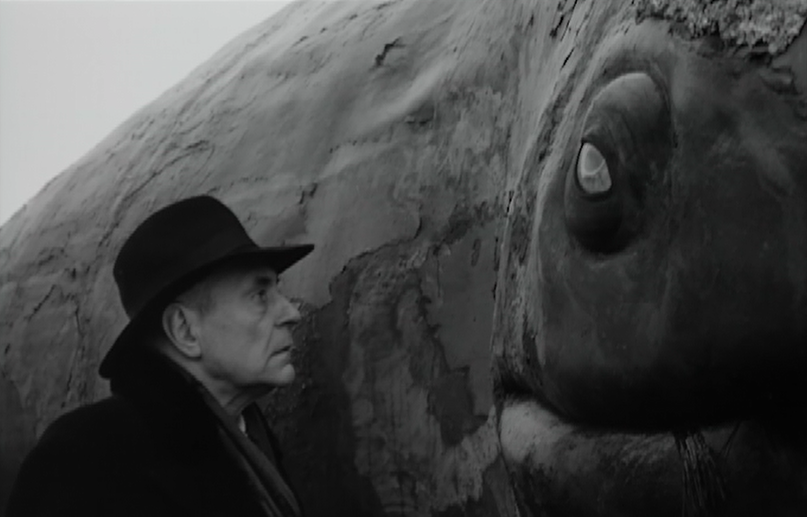Werckmeister Harmonies (2000, Béla Tarr and Ágnes Hranitzky)
Werckmeister Harmonies is a cinematic endurance test.
As each shot lingers far beyond the five-minute mark and characters’ ruminations become increasingly obscure, it’s impossible not to momentarily drift into deep thought or lose patience. It’s a shame that the pace is so uncompromising, because the photography is richly textured and emotional moments stirring. More adventurous viewers may be inclined to forgive 2-plus hours of meandering, but even those familiar with this type of rigorous artistic exercise will find Werckmeister more successful in concept than execution.
A kindred spirit to Andrei Tarkovsky, Hungarian filmmaker Béla Tarr specializes in stoic, cerebral think pieces, made up of hypnotic long takes, color-stripped photography and bleak mindset. At his best, his films are capable of striking a melancholic shroud over the audience (see Turin Horse), making the viewer a participant in a grim, funereal dirge. At worst, he can take an inconsequential moment and endlessly magnify it, trying to bring the sublime to the mundane. His efforts are high-minded and worthy, but not always entertaining.
Visually, Tarr is fascinated by the way objects and people cast shadows, guiding his lens towards the skeletal outlines painted by faint light under an opaque sky. The monotonous and rhythmic marching of his figures in the dark hypnotizes the viewer, drawing them parallel to the emotional isolation of his somnambulistic characters and reflecting the despair inherent in the life of the working poor.
In contrast to the zombies that occupy this dreary vision of Hungarian life, Janos, our protagonist, takes pleasure in the wonders of astronomy and the anticipation of a forthcoming carnival attraction. Promising a whale of massive proportions and a mysterious “prince,” the event fills Janos with child-like wonder, while it exacerbates his neighbors’ superstition and ignorance.
Gradually, the whale and prince create a spiritual rift amongst the townspeople, acting as epiphany for the open-minded and inciting violence in the corrupt and shallow. The concluding moments find the town in ruins, destroyed by a haze of chaos and fury provoked by a profound fear of change.
What sounds like a straight-forward narrative on paper unfolds as one endless, poetic non-sequitur. Characters speak in monologues that unravel like riddles, cloaked in esoteric navel-gazing of dubious meaning and eye-rolling pseudo-profundity (ex. “Great frozen mountains of refuse are everywhere”). The willingness to dissect these labyrinthine passages depends on the virtue and focus of the viewer, but diving into these murky waters may be a thankless task. What lies beneath a few moments of haunting brilliance is an impenetrable work of frustration, offering little reward for diligent contemplation.
Werckmeister Harmonies (Facets Video, 2000)
Directed by Béla Tarr and Ágnes Hranitzky
Written by László Krasznahorkai and Béla Tarr
Additional Dialogue by Péter Dobai, Gyuri Dósa Kiss and György Fehér
Photographed by Patrick de Ranter, Miklós Gurbán, Erwin Lanzensberger, Gábor Medvigy, Emil Novák and Rob Tregenza

